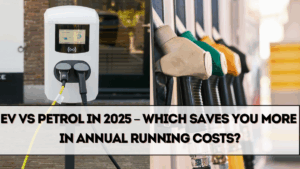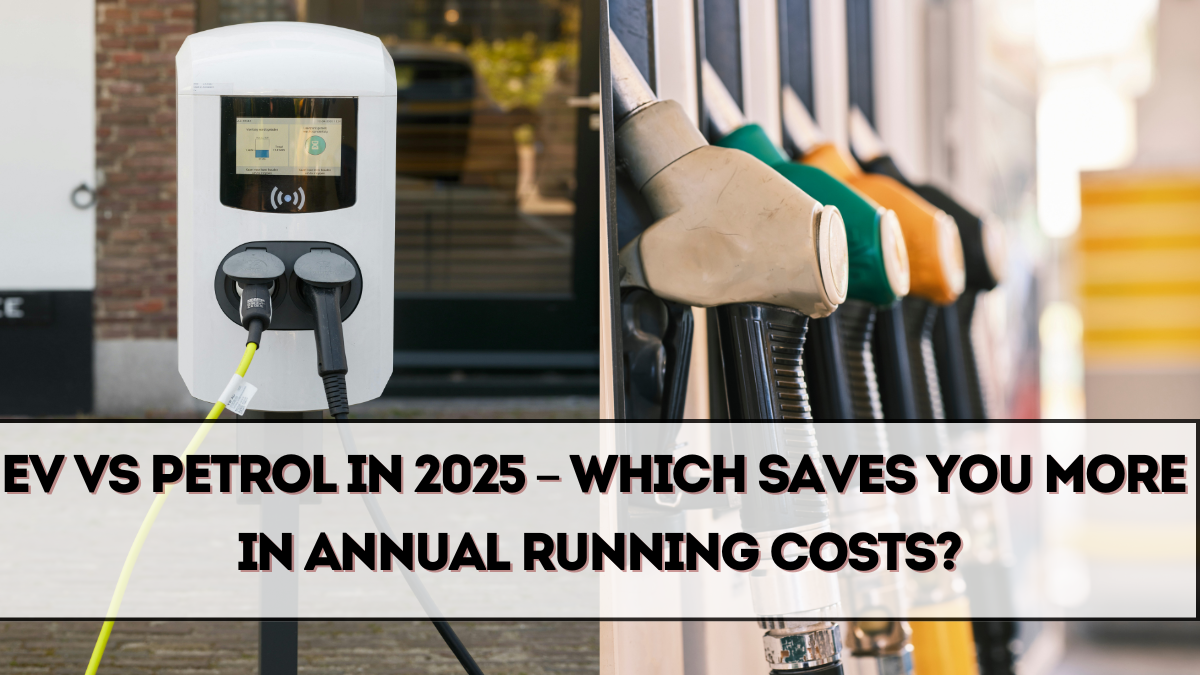With fuel prices climbing and electric vehicle adoption accelerating, the question on every buyer’s mind is clear: what’s cheaper in the long run—petrol or electric cars? The Petrol vs EV Running Cost 2025 comparison reveals major differences in daily expenses, annual savings, and long-term value. From fuel vs charging cost to maintenance and government incentives, the numbers show a significant shift in affordability.

The Current Scenario in 2025
The automotive market has matured since the early days of electric cars. EVs are no longer seen as luxury purchases; they are mainstream choices for middle-class buyers in the US, UK, Europe, and Australia. Meanwhile, petrol and diesel vehicles face rising taxes, stricter emission standards, and fluctuating fuel prices. This year, comparisons are more relevant than ever, as consumers seek real financial benefits from switching to electric mobility.
Fuel vs Charging Cost Breakdown
One of the most important aspects of Petrol vs EV Running Cost 2025 is the direct comparison between fuel and charging expenses.
-
Petrol Cars:
-
Average fuel price in 2025: $4.20 per gallon (US), £1.65 per liter (UK).
-
Average mileage: 25 miles per gallon.
-
Annual driving distance: 12,000 miles.
-
Annual fuel cost: approx. $2,016 (US) or £3,168 (UK).
-
-
Electric Vehicles:
-
Average home charging cost: $0.14 per kWh (US), £0.28 per kWh (UK).
-
Energy efficiency: 3.5 miles per kWh.
-
Annual consumption: ~3,430 kWh for 12,000 miles.
-
Annual charging cost: approx. $480 (US) or £960 (UK).
-
Result: EV owners save around $1,500–1,600 per year in the US and nearly £2,200 in the UK on fuel vs charging.
Maintenance Costs: Who Wins in 2025?
-
Petrol Cars: Require oil changes, engine servicing, gearbox repairs, and exhaust replacements. Annual maintenance averages $900–$1,200.
-
EVs: No oil changes, fewer moving parts, and regenerative braking reduces wear. Annual maintenance is approx. $300–$500.
Result: EVs save another $600–$700 annually on maintenance compared to petrol cars.
Government Incentives and Taxes
Governments worldwide are encouraging EV adoption through incentives, rebates, and reduced taxes.
-
US: Federal tax credits up to $7,500 for eligible models.
-
UK: Reduced road tax for EVs until 2025, with gradual introduction of EV road tax afterward.
-
Australia: Some states still offer stamp duty waivers and registration discounts.
-
Europe: Subsidies and toll exemptions remain widespread.
On the other hand, petrol cars are increasingly penalized through higher road tax, congestion charges, and emission zone fees.
Annual Cost Comparison – Petrol vs EV (2025)
| Expense Category | Petrol Car (Annual) | Electric Car (Annual) | Savings with EV |
|---|---|---|---|
| Fuel/Charging | $2,016 (US avg) | $480 | $1,536 |
| Maintenance | $1,000 | $400 | $600 |
| Road/Emission Tax | $350 | $100 | $250 |
| Total Annual Cost | $3,366 | $980 | $2,386 |
This table shows EVs cost less than one-third of petrol cars to run annually.
Long-Term Savings Over 8 Years
Considering the average battery warranty of 8 years / 100,000–150,000 miles, EVs provide massive cumulative savings.
-
Petrol car 8-year running cost: ~$26,928.
-
EV 8-year running cost: ~$7,840.
-
Total Savings with EV: ~$19,000.
Even factoring in potential battery replacement after 10+ years, EVs remain financially advantageous.
The Resale Value Factor
One area where petrol cars still hold some ground is resale value.
-
Petrol vehicles with strong reliability (Toyota, Honda) retain value better in rural markets.
-
EV resale value is improving in 2025, but concerns about battery life still affect depreciation. Tesla, Hyundai, and BYD models, however, are showing strong demand.
Which Is Right for You in 2025?
-
Choose EV if:
-
You drive regularly (10,000+ miles per year).
-
You have home charging access.
-
You want lower long-term costs and tax benefits.
-
-
Choose Petrol if:
-
You live in remote areas with limited charging infrastructure.
-
You prefer lower upfront purchase price (though this gap is shrinking).
-
You are concerned about EV resale value.
-
Future Outlook: Petrol vs EV Beyond 2025
Looking ahead, experts believe:
-
EV running costs will drop further as charging networks expand and renewable energy gets cheaper.
-
Petrol cars will continue to face higher taxes, congestion fees, and policy restrictions.
-
Battery technology improvements will extend EV range and reduce replacement costs.
-
By 2030, EVs will be significantly cheaper to own in every category.
FAQs
How much can I save annually by switching from petrol to EV in 2025?
On average, US drivers save $2,000+ per year, while UK drivers save even more due to high fuel costs.
Are EVs more expensive to maintain than petrol cars?
No, EVs are cheaper to maintain because they have fewer moving parts and no need for oil changes.
Do government incentives make EVs cheaper in 2025?
Yes, incentives like tax credits, rebates, and road tax exemptions significantly reduce total ownership cost.
Will EVs hold resale value better in the future?
Yes, as battery technology improves and demand grows, EVs are expected to retain stronger resale value compared to earlier years.
Click here to know more.
